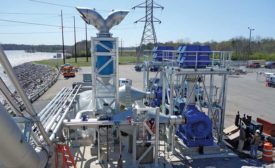Home » FERC
Articles Tagged with ''FERC''
Legal
US Court Orders Greenhouse-Gas Emissions Impact in Pipeline Review
Appellate court decision, while split, would color FERC project approvals
Read More
The latest news and information
#1 Source for Construction News, Data, Rankings, Analysis, and Commentary
JOIN ENR UNLIMITEDCopyright ©2025. All Rights Reserved BNP Media.
Design, CMS, Hosting & Web Development :: ePublishing





